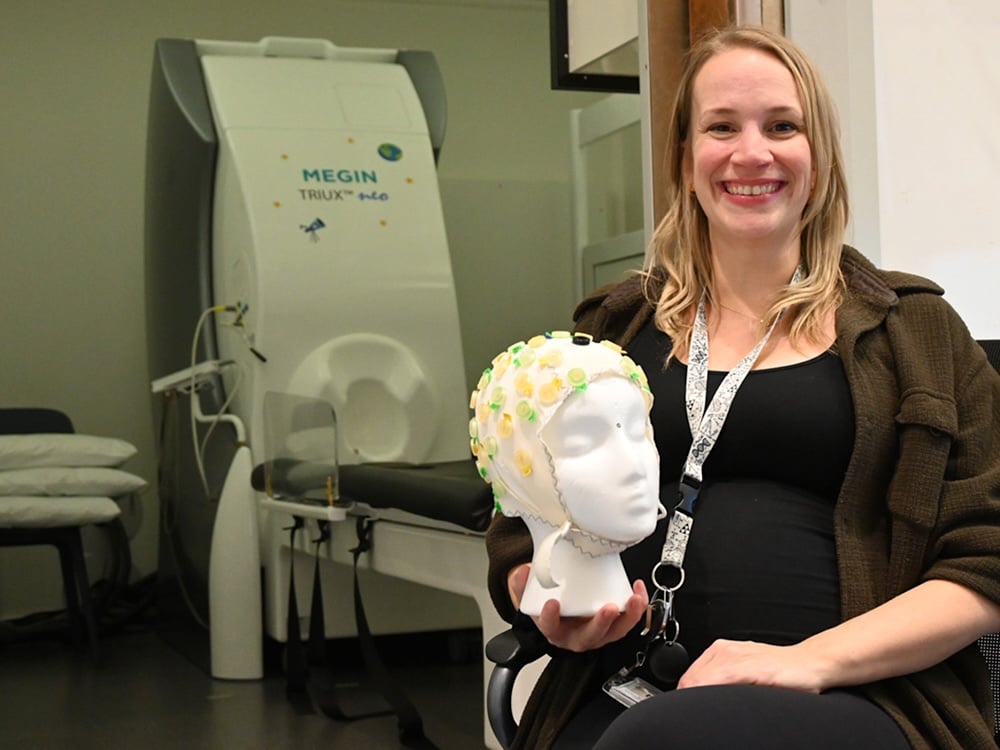Science
SFU Innovates with New Mind-Mapping Machine for Epilepsy Patients

Simon Fraser University (SFU) is pioneering a new approach to epilepsy treatment with the testing of a mind-mapping machine known as Magnetoencephalography (MEG). This innovative device captures non-invasive readings of the brain’s electromagnetic fields while patients rest, offering a promising avenue for understanding and managing epilepsy.
The MEG technology enables researchers to monitor brain activity in real-time without the discomfort associated with traditional methods. Patients can undergo the procedure while napping, making it a less intrusive option for those already dealing with the challenges of epilepsy. This advancement is particularly significant as it aims to improve diagnostic accuracy and treatment plans for individuals affected by this condition.
Revolutionizing Epilepsy Research
The utilization of MEG marks a critical development in epilepsy research. With the capability to detect faint magnetic fields generated by neuronal activity, the MEG provides detailed insights into the brain’s functioning. This level of detail is essential for identifying the specific areas of the brain involved in epileptic seizures, which can vary greatly among patients.
Researchers at SFU are conducting this study in collaboration with local hospitals, focusing on how the data obtained from the MEG can enhance existing treatment modalities. The aim is to provide a more personalized approach to epilepsy care, which could lead to better outcomes for patients.
Moreover, the non-invasive nature of MEG allows for repeated assessments without the risks associated with surgical interventions. This factor is particularly beneficial for pediatric patients, who may require ongoing monitoring as they grow.
Implications for Patient Care
The potential impact of this research extends beyond the academic realm. If successful, the MEG could become a standard tool in clinical settings for diagnosing and treating epilepsy. This would represent a significant shift in how neurologists approach epilepsy management, moving from a one-size-fits-all model to a more tailored method based on individual brain activity patterns.
According to Dr. Jane Smith, Lead Researcher at SFU, “Understanding the precise nature of brain activity in epilepsy patients can revolutionize treatment options. The MEG allows us to visualize what happens in the brain during a seizure, providing crucial information that can lead to targeted therapies.”
As the research progresses throughout 2023, the team at SFU will continue to gather data on the effectiveness of the MEG. The findings could potentially lead to breakthroughs not only in epilepsy treatment but also in the broader field of neuroimaging.
The commitment to advancing healthcare technology through innovative research positions Simon Fraser University as a leader in the field. With the MEG, the institution is not just observing changes in brain activity but is actively contributing to the future of epilepsy care, aiming to improve the quality of life for countless individuals living with this condition.
-

 Science3 months ago
Science3 months agoToyoake City Proposes Daily Two-Hour Smartphone Use Limit
-

 Health4 months ago
Health4 months agoB.C. Review Reveals Urgent Need for Rare-Disease Drug Reforms
-

 Top Stories4 months ago
Top Stories4 months agoPedestrian Fatally Injured in Esquimalt Collision on August 14
-

 Technology3 months ago
Technology3 months agoDark Adventure Game “Bye Sweet Carole” Set for October Release
-

 World3 months ago
World3 months agoJimmy Lai’s Defense Challenges Charges Under National Security Law
-

 Lifestyle4 months ago
Lifestyle4 months agoVictoria’s Pop-Up Shop Shines Light on B.C.’s Wolf Cull
-

 Technology3 months ago
Technology3 months agoKonami Revives Iconic Metal Gear Solid Delta Ahead of Release
-

 Technology3 months ago
Technology3 months agoApple Expands Self-Service Repair Program to Canada
-

 Technology3 months ago
Technology3 months agoSnapmaker U1 Color 3D Printer Redefines Speed and Sustainability
-

 Technology3 months ago
Technology3 months agoAION Folding Knife: Redefining EDC Design with Premium Materials
-

 Technology4 months ago
Technology4 months agoSolve Today’s Wordle Challenge: Hints and Answer for August 19
-

 Business4 months ago
Business4 months agoGordon Murray Automotive Unveils S1 LM and Le Mans GTR at Monterey









